#Japanese language translation
Text

Japanese Language Translation Benefits for Business!
Japanese translation services are essential for businesses that want to tap into the Japanese market. Companies can ensure that their materials are accurately translated and culturally appropriate by working with a professional language service provider. This can help businesses to expand their reach and build strong relationships with their Japanese counterparts. Japanese language translation can help businesses improve their brand image and customer satisfaction.
Get a free quote today! [email protected]
For more about our services, Visit Our Website: https://www.delshlanguageconsultancy.com/portfolio/japanese-language-translation-benefits-for-business/
0 notes
Text

Benefits of learning Japanese
The Japanese market is the third-largest in the world. It has a highly stable economy and enormous purchasing power. Yet, not all companies think of Japan first when they decide to go international. One of the strong reasons behind this hesitation is the cultural differences and language.
#Japan in Japanese translation
#Japanese language translation#Japan in Japanese translation#Japanese software localization#Japanese website localization#Braahmam International
0 notes
Text





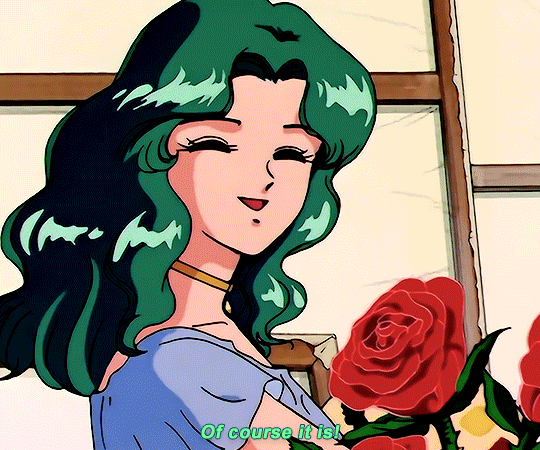
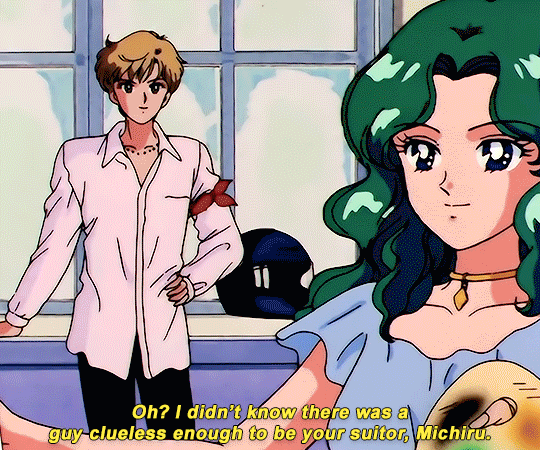
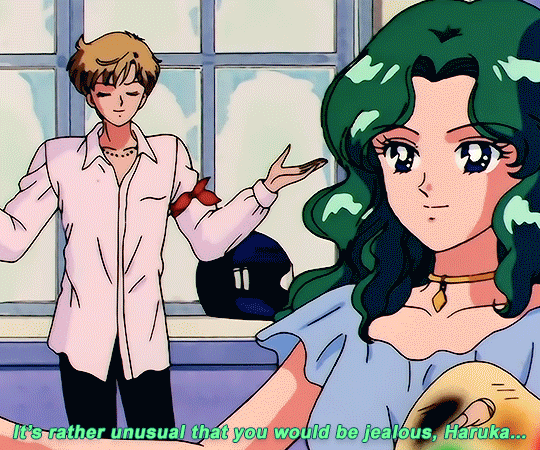
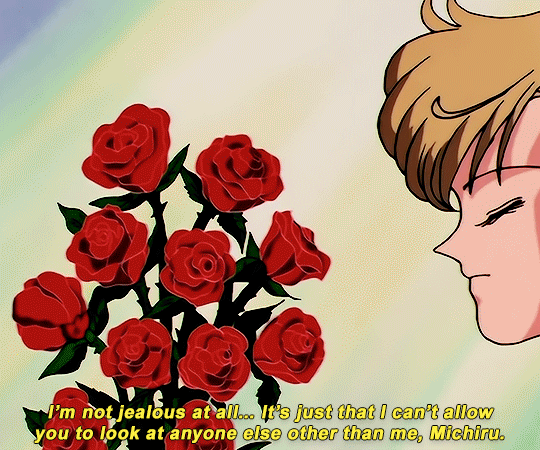
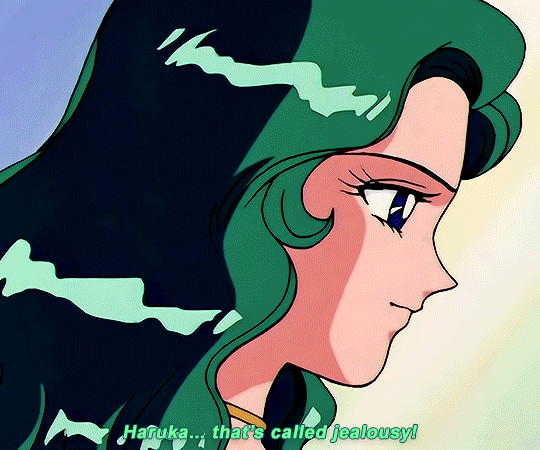
SAILOR MOON S: Episode 18 - 「芸術は愛の爆発!ちびうさの初恋」
#animeedit#sailor moon#sailormoonedit#oldanimeedit#harumichi#haruka x michiru#smedit#wlwedit#haruka tenoh#kaioh michiru#ep 107#bssm#bssmedit#pretty guardian sailor moon#bishojo senshi sailor moon#sailor neptune#sailor uranus#michiru kaioh#tenoh haruka#HI YES THIS BLOG IS ALIVE im trying to juggle trying to make gifs for this sideblog and the other fandom one lol#i had to change some of the translation bc the context was slightly wrong...#japanese is such a hard language to translate into english sometimes#also coloring anime is so difficult sometimes im really not used to it#especially old anime haha
714 notes
·
View notes
Text
WHY THE NEED TO OUTSOURCE JAPANESE LANGUAGE TRANSLATION SERVICES FOR YOUR BUSINESS SUCCESS?
While an abundance of automated translation tools is available on the net, many wonders why professional translation services are required; these are the wrong notions nurtured by the audiences. Automated translated software does a thing very quickly, and translations perform in quick succession and the general work it does.
However, translation encompasses a wide gamut of various jobs that automated software tools cannot do. The Japanese Word Translation does high-level, sophisticated work and other complicated tasks.
Japan is one of the most developed economies, and its educated workforce and large affluent audiences make it one of the most notable consumer markets globally.
The Japanese language is quite a departure from the English word order. Japanese can, in a particular way, express themselves. So a direct translation to English can prove disastrous. With that premise, the organization needs reliable Best Japanese Translators to impact the Japanese audience.
A survey reveals that in the fiscal year of 2020, the market size in translation in the Japanese language projects being at 254 yen. That year, the overall language business market size was more or less 782 billion yen. This trend continues to rise, moving ahead.

Japanese Document Translation Companies: Why is Your Business needs it?
As mentioned above, the translation tools do the basics. Precisely, in a complex language like Japanese, it does even worse. Hence question of professional Best online Japanese Translator comes into prominence.
Let's walk through why businesses resort to tremendous faith in professional translation services to scale their brand visibility globally.
Mindful of Accidental Offence
When involved in free translation services, it is just a word-to-word translation from one language to another. If the organizations pay attention to it, it finds the result is entirely catastrophic.- If it happens, the company never tries to apply this method. In the first place, Since the Japanese language riddles with many nuances and context, it isn't easy to decipher the language, but the backdrop plays a pivotal role.
However, professional Best Japanese Translators do justice to delivering a culturally sensitive and accurate translation that keeps the essence of the language intact.
On the contrary, free translation tools cannot do more than basic things. Therefore, never resort to free automated translation software as it may offend the sentiment of the Japanese audience because of the wrong translation.
Access to Potential Market
Japan's flourishing economy offers a lot of business opportunities. Still, to make inroads in the Japanese market, the organizations make a substantial endeavour to set foot in the Japanese market. English is not very popular in the Japanese market like in other countries.
The business will be more effective if the organizations approach their native language. Given the complex nature of Japanese, it is daunting for a non-native speaker to strike the right chord.
The good news is that reliable and efficient translation service providers deliver the right solutions. Therefore, professional Japanese Word translation is the best bait.
Fast Delivery
Quick delivery is the key if the organizations are dealing with a Japanese client or leveraging the potential market condition. In fast delivery, care should take that it does not lower the quality level; otherwise, it shows the companies in poor light.
It has a tremendous effect on their business progression. If the company delivers quality, accurate, fast turnaround translation, it will be a sure shot to confidently move ahead in the designated region.
Know the Culture
No iotas of doubt that accuracy is very important in translation, and at the same, understanding the target culture is also equally vital. The right mix of the said things produces the desired results. Cultural sensitivities are a delicate proposition, and correctly translating them requires in-depth knowledge of aimed culture.
Suppose the organization fails to comprehend the established practice and tradition of Japan. In that case, there is every chance your products and services flop miserably, which probably keeps them wondering why they are unsuccessful. Professional Japanese Translator Services take care of the critical aspect of translation and significantly bring new prospects for the business.
Reduce the Business Budget Pinch
Many have preconceived notions that hiring translation services cost more to the company. But, in reality, the reverse is true. Before delving deep into it, choose the certified translation services; otherwise, outsourcing cheap and greenhorn services do more harm than good, draining precious time to nothing.
Most companies initially try their in-house team to handle the project. However, it is not a good move for the organization. The reasons are given below:
Involving an in-house team indicates the time spends on finding the right candidate.
A comprehensive time requires to unearth the right candidate Ensure that the translation can provide accurate and culturally relevant to the target language
Expertly handle the latest translation equipment, i.e., Software and hardware
The quality Assurance team needs to press into service to ascertain the quality of translation.
The organizations require outsourcing Subject matter experts and specialist translators.
As mentioned above, the list is endless. The onus is on the in-house if the in-house team makes glaring mistakes.
So, a lot of factors are associated with it. On the contrary, a Japanese Website Translator is a much better option as the organizations virtually do not need to pump money to purchase expensive equipment required for translation—moreover, no cost for traveling and other fringe expenses on the part of the organization. Therefore, a significant move to prevent a pinch in the company’s budget.
Wrapping Up
The above point shows that hiring professional Translate Japanese companies is significantly worthwhile.
0 notes
Note
have you seen the commentary from the p5r artbook going around? the shuake part of my dash is losing it a bit at the implication that their wishes were mutual!!! that seems to be what some people are getting from the commentary at least… amy insights?

Hi! I have been through the artbook. It's great, isn't it? :D
The image above is called "One Ending", and the creator caption (by illustrator Akane Kabayashi) reads:
When I think about how Akechi's wish was to play chess after school with the protagonist, I almost want to call him out with "You liked him after all, didn't you!"
Look at that. We're told about Akechi's wish, and what it included. We're as good as told outright that he likes Joker—and this isn't the only time, there's also this:


—There are a whole lot of things we can imagine, based on how the protagonist was depicted as someone special to Akechi.
Those are more or less the exact emotions represented during Akechi's confidant. (Mumon Usuda, chief designer)
"someone special" here is 特別な存在 tokubetsuna sonzai—literally "a special presence". It means a special person, and more than that; it describes someone you find compelling, someone you can't look away from, someone who becomes one of your most important people, the centre of your world. It's another term that is often romantic, but isn't necessarily romantic.
(In the same way, I think Kabayashi's suki jan! is more tongue-in-cheek than it is a cast-iron confirmation that Akechi was canonly in love with Joker. The language there is teasing, it's ambiguous, it's baity; Kabayashi is joking. This is a rank 6—as they say, if you know, you know. But it is of course ultimately up to all of you.)
There's another mention of this image, down in the creator interview:

Out of all the Maruki ending illustrations, it was Akechi's that stuck with me the most. It made such an impression to see them opening up as friends, having a fun, peaceful time together like high school students should. (Mumon Usuda, chief designer)
What really strikes me in all of this is the emphasis the creators put on the fact that this is Akechi's illustration, Akechi's wish. Because I've thought for a while that we know Akechi has a wish. You can see him struggling with his refusals to Maruki in the first week of January. And you can hear his wish spoken—when Maruki repeats it back to him, during the boss fight, on 2/3:
Maruki
{F1 81}君たちとなら、君も過ちのない道を歩めるかも知れないじゃないか!
{F1 81}-kun-tachi to nara, kimi mo ayamachi no nai michi o ayumeru kamoshirenai ja nai ka!
If you're with {F1 81}―kun and his friends, you could begin to atone for what you've done!
Think about it! With [Amamiya]-kun and his friends beside you, you could choose a path with no mistakes as well!
So this wish has several parts. First, there's that kimi mo, "you also"; it's tempting to read this as Maruki also wanting his new world to erase his past mistakes. Second, there's the first part, "if you're with [Amamiya]-kun and his friends". Where to even start here?
Being with Joker and the others is a prerequisite for the second half of Akechi's wish. It doesn't just coexist, it enables the rest of it. Just like his words in the engine room, "I wonder why we couldn't have met a few years earlier, [Ren]..."
Remember, Akechi's whole arc is about his rejection of trust and friendship, and his insistence on doing everything himself. This is precisely what Futaba calls him out on—"you trusted no one", or "you played life in single-player mode". This is what he unlearns at the climax of the engine room, when he realises he isn't prepared to let the others die—and follows through to save them.
Akechi is nothing without others, and he knows it. Without their support, which he believes he has no right to, he has no hope of living a better life, even were he to be given the chance—and he knows that, too. He has learned, and he has grown—and yet he knows the things he needs and wants so badly are forever inaccessible.
And his wish is about all the Phantom Thieves, not just Joker. There are many tiny references to this end—not least the original Japanese rank 10 line for his confidant, where he sacrifices himself for all of you. Joker is his compelling presence, his someone special, but he's formed small bonds with the others too, God help him.
and then there's the crime thing
The localisation frames Akechi's wish in terms of atonement, but that's not what's on offer. You cannot, after all, atone for things you never did. We see Akechi's wish put into practice, in the Maruki ending, where he appears with his friends beside him, wholly innocent and with unstained hands. And we see it in the first week of January, after he has finally met Maruki and spoken to him:

Akechi: Ah, that reminds me—there was one more thing I wanted to tell you.
Akechi: About the reality Maruki's put us in...
Akechi: It seems that Okumura and Wakaba are both considered alive by all accounts.
[Ren: They're not dead anymore? / What do you mean?]
Akechi: They aren't mere illusions, or cognitive beings—they truly are alive and existing in this world.
Akechi: In fact, their deaths seem to have never taken place at all in this reality.
[Ren: What happened to Shido?]
Akechi: Shido was the only one arrested on the crime of attempting to overthrow the government...
Akechi: It seems the Phantom Thieves were causing a stir in this society as well, but there's no record of your arrest now.
Akechi: Basically, in this reality, you and I haven't committed any crimes.
While Akechi still remembers his crimes, they never took place. They have been undone, and only his lingering memory—and Joker's, at this point—speaks to them. He objects to this on countless levels, he summons all the strength he has to refuse it, but don't make the mistake of thinking that means he doesn't want it. This is Akechi's wish in action.
People are often very certain that Akechi's resolve in the third semester is like iron—that he rejects Maruki's offers right away, is never tempted, never wavers. But that can't be true. We know he's afraid to die. We know about the bad end where you don't complete the Palace, where Akechi says nothing and stares at the floor, seemingly blaming himself internally while all the others blame themselves aloud, for being unable to say no to Maruki's temptations. We know how he responds to this assertion of Maruki's—Maruki, who has perfectly summed up what we know all the other PTs wanted, and who (even if Word of God hadn't just confirmed Akechi's wish) we have, honestly, no reason to doubt.
Because Akechi never refutes this wish that Maruki describes. He never says he doesn't want it. He just rejects it—like all the others, who so desperately want what Maruki could give them. Futaba's mother, Haru's father. Akechi's life, and his innocence. And the people who might have been his friends, if he could dare, one day, to ask.
Akechi is tested just like the others, and the price he pays for his defiance is perhaps the highest of all.
and finally
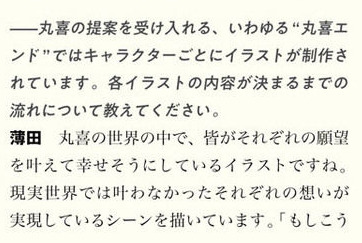
[The Maruki ending illustrations are] of Maruki's world, where everyone's wishes are granted and they seem happy. The scene shows their actualised wishes, which were never granted in the real world. (Mumon Usuda, chief designer)
We shouldn't forget the price Akechi pays for his impossible wish. Sure, the vision of himself being altered like Sumire clearly haunts him, and I'm sure it made the choice easier—but I don't think it made it that easy. Instead of taking the dream Maruki offered him, Akechi chose to face up to what he'd done, and who he'd become; at the very end, in the third semester and in the engine room, he always makes the right choice.
And that choice was taken away from him. Agency over his life and death, his own acts, and who he would even be—Joker and Maruki take it all away from him and make him a puppet, just like Shido.
Maruki's ending isn't pretty.
revision history
Click here for the latest version.
v1.0 (2024/03/29)—first published.
#asks#persona 5#p5 meta#things i translate#japanese language#word of god#shuake#goro akechi#takuto maruki
536 notes
·
View notes
Text
I’ve been having trouble putting this idea into words so you’ll have to bear with me, but I was struck when I saw a Japanese news program interviewing foreign tourists in Japan, and some australian women were dubbed over with a stereotypically feminine speech register (lots of のs and わs), and my first thought was “they weren’t speaking that femininely in english”.
A friend of mine from the UK recently mentioned that he noticed that australia has a generally more masculine culture than england - he felt that everyone is a bit more masculine here, including women. This kind of confirmed to me that my impressions of the dubbing were right - the tourists were speaking in a relatively (internationally) more masculine way. Yet their dub made them sound so much more feminine.
It made me wonder. When translating something, do you translate the manner of speaking “directly”, or “relatively” in terms of cultural norms? Maybe this graph will help me explain the question.
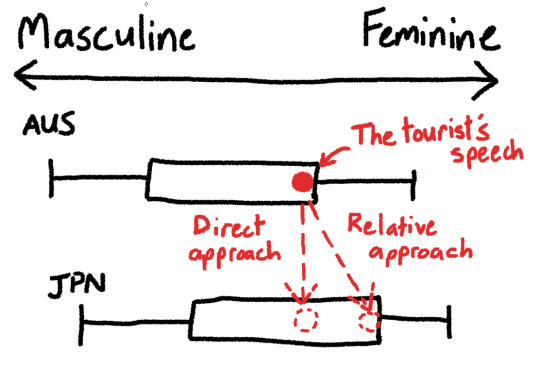
A direct appoach in this case might appear to a Japanese person to result in an unexpectedly masculine register, but preserves how the speaker's cultural upbringing has influenced their speech.
The news program translators chose the relative approach - I think I would prefer the direct approach. I think I prefer it because I believe translation should be a rewriting of the original utterance as if the speaker was originally speaking the target language, and the direct approach compliments that way of thinking the best.
Actually now that I type that, I’m second guessing myself. Does it? It does, if for the purposes of the “rewrite it as if they spoke japanese” thought experiment, we suppose the speaker magically learned japanese seconds before making the utterance, but what if we suppose the speaker magically grew up learning japanese - then maybe they would conform to the relative cultural values. But also, maybe they would never have said such a thing in the first place - their original utterance was informed by their upbringing and cultural values, so how could you possibly know what they would have said if they had known japanese from birth? Maybe my initial instinct was right after all?
If you work in translation, I’m very interested to hear if you have come across this problem and how you deal with it 🙏
Further reading: I think this question also ties into this problem I’ve been struggling to answer for a while.
636 notes
·
View notes
Photo

Dial +91-9958298424 Japanese Language Translation Company in Mumbai
Historical revolutions have caused the Japanese language to be divided into old Japanese language and modern Japanese language. It is believed that Old Japanese began in the 7th century AD and is the coldest form of Japanese written today. If you are looking the best Japanese Language Translation Company in Mumbai, Delhi, Bangalore, Pune, Kolkata, Chennai in india. Read More : https://www.laclasse.in/
#Japanese Language Translation Company in Mumbai#Japanese Language Translation Company#Japanese Language Translation#Japanese Language
1 note
·
View note
Text
forewarning that this is mostly just an observational ramble
one thing I've gathered from looking around older western fantasy otaku sites is that, presumably in large part because of the order in which things entered mainstream consciousness, sauron is talked about pretty consistently as the final boss of the lord of the rings
technically, this is true of everywhere, but I want to emphasise that it is extremely common to see younger fantasy otaku a decade or two ago use ラスボス when explaining who he is, as a primary descriptor
[before going any further on this, it probably bears mentioning that the japanese translation of lord of the rings is a bit divisive. when it comes up, it's either in the context of how impressive the translation is (skews older) or in how unreadable it is (skews younger), because it's translated into antiquity prose. apparently exceptionally so, even for a fantasy novel, so it was very much extreme nerd shit]
a big part of this is, of course, just the idea of the final boss having more awareness than tolkien at the time the movies were coming out. I imagine almost the exact same thing would happen more or less anywhere that video games hit mainstream nerd awareness before tolkien did, but there's something else that I think might have something to do with it, because if you're looking at old enough threads, you notice that not only is sauron being explained as the final boss, but this is being mentioned in contrast to morgoth not being the final boss
which seems a bit random (morgoth doesn't exactly come up enough in lotr proper to cause this confusion), if you don't know that angband, where morgoth is the final boss and sauron is just the midboss, was pretty popular with western fantasy otaku. well, popular in the way that cult classics are, but you know how it goes
with that in mind, it makes sense that it was (at one point, before tolkien was more accessible through other channels) something people called each other fake fans over
so in a kind of interesting way, namedropping sauron in fantasy otaku spaces that skewed younger (for a time) was almost equivalent to namedropping morgoth in western fantasy nerd spaces. that all kind of stops being the case once you have the peter jackson movies immediately at hand, though
there's also the fact that, because it's a little harder to read lord of the rings in japanese, someone who's casually into the book is much more likely to also go ahead and read the silmarillion, which helped rings of power get incredibly popular with older audiences in japan when it came out. as a fun side effect of all this, there's a bit more morgoth x sauron shipping around
#also should be clarified that the specific way that tolkien is translated in japanese is like#seemingly made to create a generational divide in people who have strong opinions on whether you should use kanji in western location names#same argument as always: do you translate for western sound or period-appropriate language#and its answer is a resounding 'both'
159 notes
·
View notes
Text
#i saw someone talking about how they had copies of the same book in multiple languages and i was like.... why tho#like i get collecting multiple language editions of a favorite of yours#but this was presented as specifically for reading in other languages#idk am i the odd one out here?#i will not read anything translated Into Japanese#the way i look at it is that i learn languages to get a deeper understanding of the author's original intent#but as of right now theres still a little bit of a language barrier#translation is already a type of barrier between you and the original work#so why would i want to be twice removed from what the author is saying#languages#langblr#studyblr#language learning#benkyou posting#polls#memes#studyinspo#polyglot#the only reason i can see myself reading a book translated into japanese is if i really want to read it but japanese is the only#available language i know#but even then#i always have so many books to read that it really wouldnt make a difference if i either a. read it or not#or b. waited for it to be translated into english#i do know that im weird about translations though
242 notes
·
View notes
Text
pronouncing the necron 'sz': personal rating list*
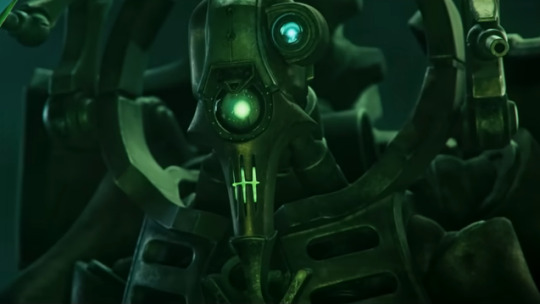
broke: /s/ only ('seras')
woke: /z/ only ('zeras')
provoke: /s/ and /z/ pronounced separately ('s-ze-ras')
bespoke: /ʂ/ or /ʃ/ ('scheras')
invoke: tensed fricative /s͈/ ('sseras')
misspoke: /s/ but evil ('ßeras')
(* Further notes in tags.)
#warhammer 40k#wh40k#necrons#illuminor szeras#necron#shitpost#german speakers i am so sorry you had to read that with your eyes 😂 i also speak german i do know eszetts can't start words#originally this was just for fun but it seems there are quite a lot of ways wh40k fans pronounce this#native english speaking fans usually seem to stick to 's'#whereas in languages that actually use this digraph it would be s/ʂ/ʃ#but in korean translations 'sz' defaults to 'z' so it's definitely 'zeras (제라스)' and 'zarekh (자렉)'#and sometimes the 's' and 'z' are both present and pronounced like in japanese ('s-za-rekh';スザーレク)#(i personally use ʃ because it seems the logical compromise)#in lore terms i think all or most of those pronunciations were used among the necrontyr and there is not one 'canon' version#variety is the spice of life it's fine they're all good. well maybe not the last one but still 😂#according to TDK the necrontyr didn't have a united language until szarekh came along so they must've had different dialects#i reckon that's why the silent king made his universal language. so people could pronounce his name how HE specifically wanted it#it's all becoming so clear now!!!! 😬
86 notes
·
View notes
Text
What’s In A Title?: Variations on “Master” in Black Butler
旦那様・当主・ご主人様・マイロード・様・坊ちゃん
Throughout the manga, we see various titles used for Vincent, Real Ciel, and Our Ciel, with these being more obvious in the original Japanese than in translation.
This post will focus on Sebastian and Tanaka and the various terms they use at different points within the story.
I personally am not an expert on keigo (the most formalized of speech that Sebastian speaks almost exclusively in in Japanese), so I am not really going to be going into the subtleties there. (Other posts have tackled this already, and probably with more expertise than I could.)
I also want to emphasize I am only now beginning to read the manga from ch 1 in Japanese (I’ve only read bits and pieces until the most recent ~25 chapters or so), so it is possible I am missing some examples or variations mentioned in other parts of the 200+ chapters not brought up here.
However, I think we can still look at these subtle differences even if you are an English speaker who knows zero about formality levels/humble speech in Japanese. And if you’re willing to take this journey with me despite these caveats, keep reading.
旦那様・当主・ご主人様・マイロード・様・坊ちゃん
Before I get into the variations between Sebastian and Tanaka, let’s look at some of the titles used:
The variations are as follows:
Dannasama - 旦那様
Toushu - 当主
Shujin - 主人
Goshujinsama - ご主人様
“my lord” - ご主人様・マイロード
Lord Ciel - シエル様
Bocchan - 坊ちゃん
Tanaka
Tanaka uses #1, #2, #3, #6, and #7. Let’s look at him first.
Dannasama - 旦那様
Means “master of the house,” but is also a term you’d use with a boss or someone of higher status, akin to “sir” in some usages in English.
Tanaka uses this term only for Vincent, so far as I know.
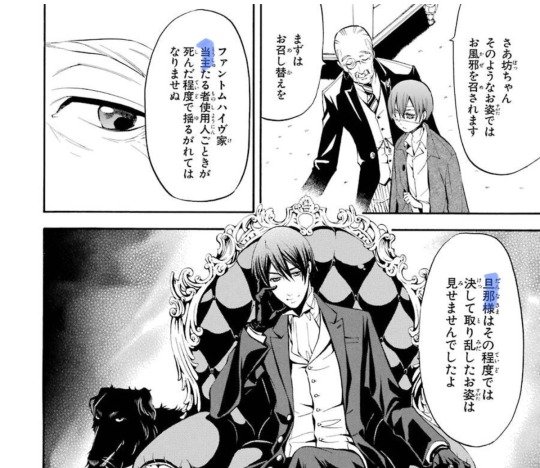
Toushu - 当主
Means “present head of the family.”
Tanaka uses this when speaking about/to Our Ciel when distinguishing him from his father, the previous head. For example, in the murder arc when he points out that it isn’t appropriate for the master of the house to be upset by a servant’s death.
Shujin - 主人
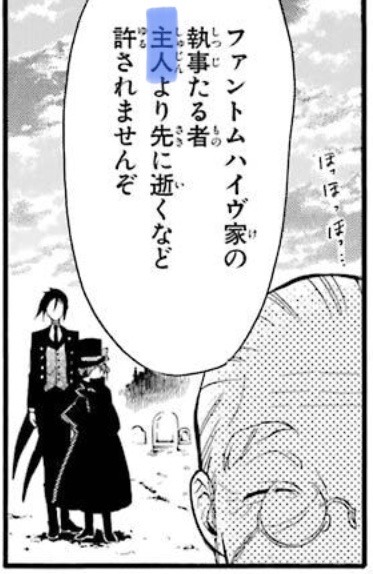
Means “head of the household” or “master” (among other uses). This version does not have the added formality/humbleness of the versions that Sebastian uses (the go- prefix and the -sama suffix).
Tanaka uses this when speaking generally about “the master” or “one’s master,” for example, in the end of the murder arc when he tells Sebastian a Phantomhive butler shouldn’t die before his master.
Lord Ciel - シエル様
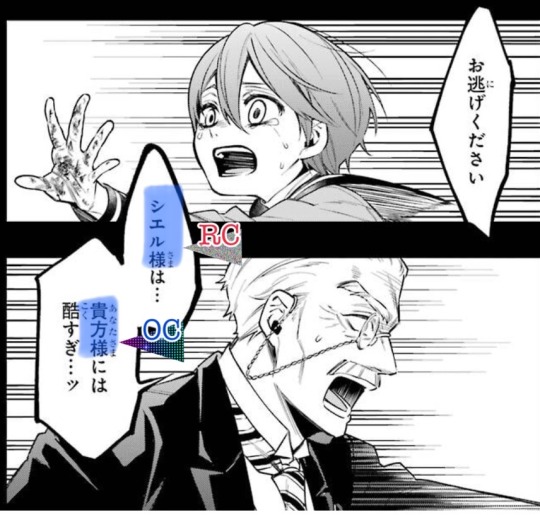
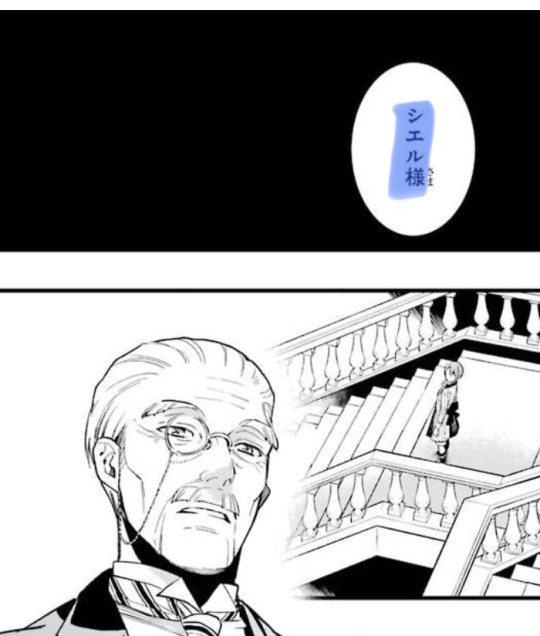
Just Ciel + the kanji for “sama,” is how Tanaka refers exclusively to Real Ciel throughout the manga, to the best of my knowledge, when speaking to or of him specifically, individually.
Above, we see how in the example on the right (in the present), Tanaka calls RC “Lord Ciel” directly, and in the example on the left, how he refers to him that way in the past as well when not directly addressing him. (OC is “you” or 貴方 there.)
Bocchan - 坊ちゃん
Means “young master,” and is how Tanaka refers to Our Ciel almost exclusively (except for the examples above), not only before the tragedy but after. He immediately knew that Ciel was OC and not his twin, and we know this because of the address.

Sebastian seems to have picked up the title from Tanaka, because he does not use it before they see him. Above, he even puts special emphasis on the title when he uses it for the first time. And as far as I know, aside from “my lord,” he refers to Ciel as such exclusively thereafter.
旦那様・当主・ご主人様・マイロード・様・坊ちゃん
Sebastian
Sebastian uses #4, #5, and #7.
Goshujinsama - ご主人様
Means “head of the household” or “master” (among other uses). This version does include the formal/humble prefix “go-” and suffix “-sama.”
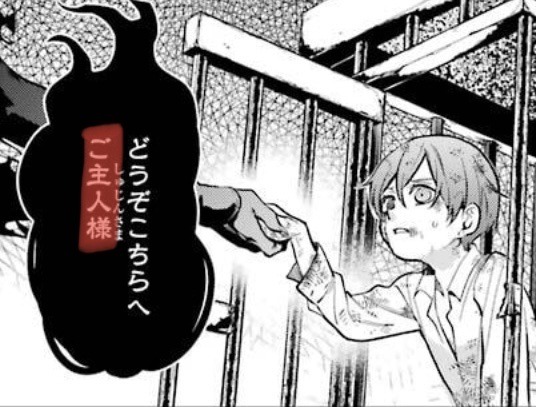
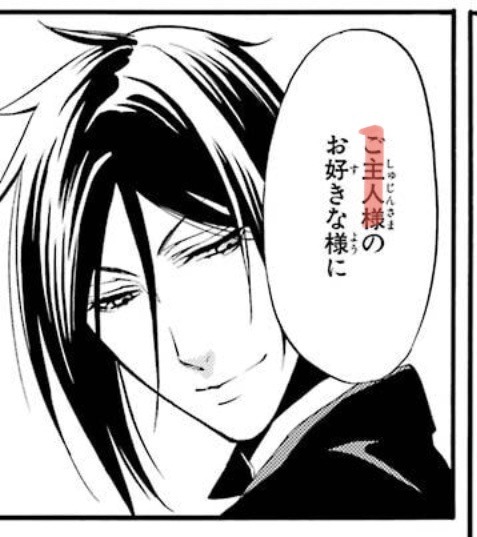
This is the first term that Sebastian uses for Ciel when he shifts from “you” (貴方, anata) to “master,” when they first begin establishing the contract. He also uses a variation on this I’ll explain next, but THIS version, said exactly like this, he stops using after their visit to Tanaka.
You can see in the above examples that he uses this address both before and after he assumes his butler form.
I expect that this is likely how Sebastian has referred to all his masters as I believe it’s the most humble/formal way of addressing one’s master (aside from more specific titles that may be used).
My Lord - ご主人様 ・マイロード
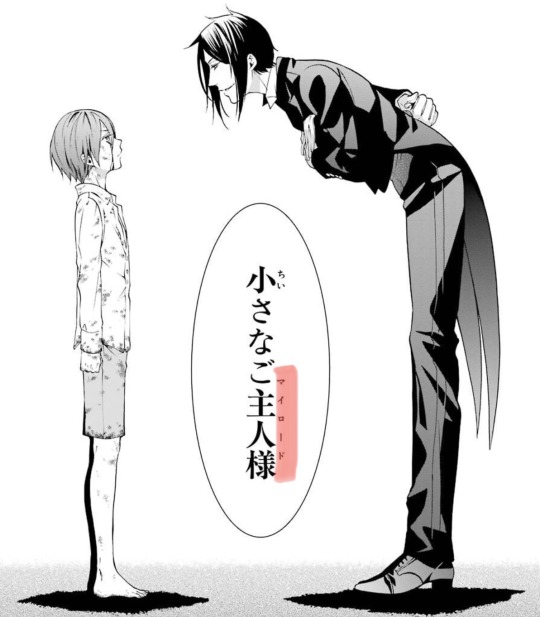
Even before he adopts “bocchan,” Sebastian sometimes refers to Ciel in English as “my lord,” as Yana informs us via the katakana spelling on the kanji. Yet she still writes it in keigo, as if to reminds us of the manner in which Sebastian speaks, and that even if he has dropped the uber formal “goshujinsama,” he is, in a sense, still using it throughout the story.
Bocchan - 坊ちゃん
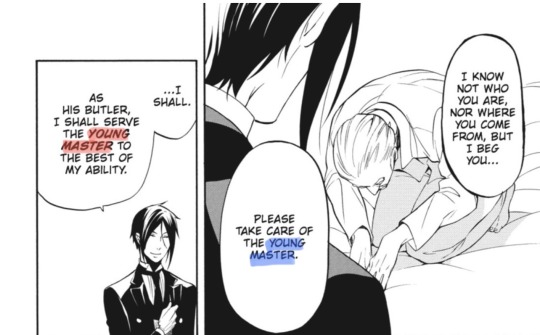
As I explained above, this seems to be a manner of address Sebastian picks up from Tanaka. It seems to imply that he does so partly because he recognizes that the old man is aware of Ciel’s real identity (unlike Madam Red, who assumes he’s RC, which is why Ciel looks so dead-eyed while Sebastian is smirking).
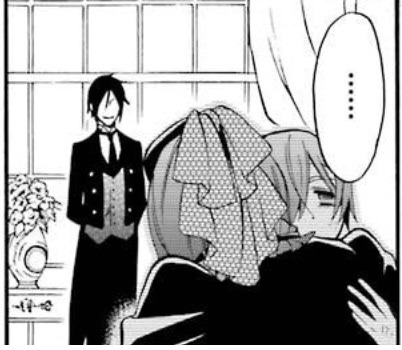
Maybe he does it to mock him at first, a reminder that Sebastian knows he’s a liar. Maybe he adopts it because he’s never had a young master before and decides it could be a fun change of pace.
Unless Yana says something or reveals more insight into Sebastian’s POV, however, we may never know exactly why he made this shift and stuck with it.
旦那様・当主・ご主人様・マイロード・様・坊ちゃん
And that’s my rundown of how “master” is used in Japanese by Sebastian and Tanaka, depending on who they’re addressing or referring to and at what point we are in the story. As you can see, most of it is lost in translation.
If you enjoyed this post, you may like to check out some of my other kuro translation posts, including my pronoun series, in which I explain why various characters use certain personal pronouns.
Reblogs and tips are also always appreciated!
#black butler#黒執事#sebastian michaelis#tanaka#ciel phantomhive#real ciel#our ciel#vincent phantomhive#poi translation#japanese language#keigo#master#young master#坊ちゃん#主人#当主#ご主人様#マイロード#旦那様#japanese vocab#poi og#100 notes
161 notes
·
View notes
Text
[Japanese→English] @panmaumau Tweet — Color Coded Translation

————————————————————————
何も知らない生き物の顔
なにもしらないいきもののかお
The face of a living thing that doesn’t know anything.
————————————————————————
Please correct me if I made a mistake
#color coded translation#japanese#japanese vocabulary#study japanese#japanese lesson#easy japanese#beginner Japanese#learning japanese#japanese lingblr#japanese linguistics#learn japanese#japanese langblr#japanese learning#japanese language#japanese vocab
80 notes
·
View notes
Text

Japanese language translation
The Japanese market is the third-largest in the world. It has a highly stable economy and enormous purchasing power. Yet, not all companies think of Japan first when they decide to go international. One of the strong reasons behind this hesitation is the cultural differences and language.
The Japanese market is also a quality-sensitive and mature market. They are used to consuming high-quality localized products. They also have limited English proficiency. It makes localization a near-mandatory step to even enter the market. And, you’d have to aim for perfection, no less, to begin to register on the Japanese consumer’s mind.
#Braamaham international#Japanese language translation#Japanese localization#Japanese software localization#Japanese translation#Japanese website localization
0 notes
Note
Tú, alcalde. ¿Hablas español? Eso sería genial :D
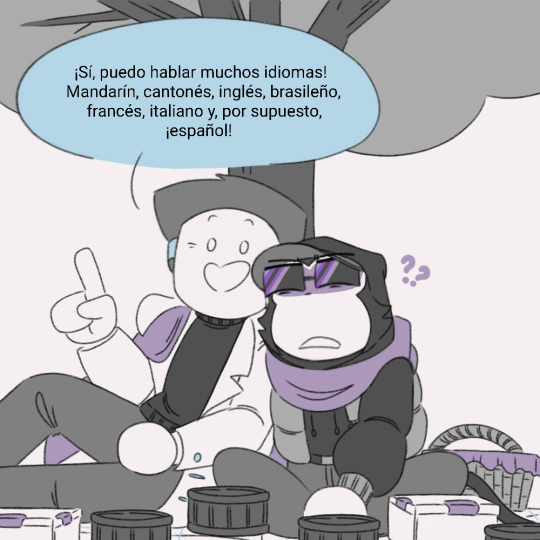
"Yes, I know many languages! Mandarin, cantonese, english, brazilian, french, italian, and of course, spanish!"
MASTER POST
Previous 💙💜
Next 💙💜
#lego monkie kid#lego monkie kid fanart#monkie kid#monkie kid fanart#lmk#lmk fanart#lmk mayor#monkie kid mayor#lmk macaque#monkie kid macaque#blue and violet#I'm so sorry I had to use google translate for this 😭#I am unfortunately not fluent in spanish#but the Mayor probably is!#I mean they did spend like 500 years looking for the skeleton key and went around the world#they picked up many languages#many more than the Mayor lists here#they probably know a few asian languages too like indian and japanese and maybe vietnamese too#Idk about russian but they might know a bit#over time they have probably learned and forgotten languages#they might have been fluent in latin once but forgot when people stopped using it#the reason Mayor knows Cantonese is because my family is from that general providence of china that speaks it#so yeah its a little self indulgent#actually if any of you realised all of the Chinese food I mention in the blue and violet series and especially in colours-#-is probably from the Guangdong province in China or Hong Kong#dim sum as mentioned in the latest chapter is a thing that came from Guangdong haha#and the egg tarts too in the egg tart chapter#funny huh?#anyways sorry for the rambling I got a little carried away#Macaque is very confused
74 notes
·
View notes
Text
i know the internet is super english centered but i wish it was more common to mention the language whenever theres talk about a voice actor too, just say "the english voice actor of xyz"? that cant be too hard to do right??
i wish there was more appreciation for non-english voice actors!! in english spaces as well as in general! i know the names of many of the english cast for zelda even though i dont like any of them and have never set my game to it but know them simply bc they are the only ones getting any mention and they are always just called "the voice of" making it seem like that is THE one and only voice
im aware that its in part bc i am mostly in english speaking online spaces and the internet IS a very english centered thing but i dont think its wrong to wish for more recognition of other actors for languages other than english or to simply want them to mention to what language they are the actor of
like i dont mean that you gotta talk about every single different voice actor but i think just mentioning it like that more directly implies that there ARE others at all, especially since alot of games dont even do other voices at all and just make english the only voice over even if the game was developed by non-english people, i just find it sad :(
#ganondoodles talks#random#i find it sad and slightly annoying#perhaps influenced a little by me not being a fan of the english translation of zelda and neither of that voice over?#perhaps so#but also in general id like to hear more about other languages even in english news#since its all so english centered#i know its a weird thing to get hung up on but#man#the japanese sounded great to me but i dont speak it despite trying to learn so idk the actual quality#but the german in largely pretty good#better than english at least#like im sorry im sure there are roles for all of those voice actors that suit them#but not these#especially zelda
140 notes
·
View notes
Note
Idk if you’ve talked about this before, but in the event where ren and akechi are playing that shooting game together there is a very funny interaction and my fellow shuake fans and I are unsure what it means.
In English, Akechi jokes that he’s practicing gunplay to take ren out. Clearly this could either be a murder joke or a date joke. In Spanish, he apparently uses a phrase that can only mean a date.
What does he say in japanese? Was it ambiguous there too or was it clearly a murder joke or date joke? Again, sorry if you already explained it lol
…also this is kinda awkward but was the usage of the term gunplay intentional or does it have multiple meanings and fanfic has just ruined me orrr…
Hello! I am so happy to be able to go over this with you. Many thanks to @platinumdream, @minkhollow42, @somethingpersonarelated and the r/spanish subreddit for verifying this one for me.
This line stands out because the Japanese and English (and also the Spanish) translations are all radically different—different enough that what we have here is a stellar example of "the Xerox effect".
Let's take a look.
the scene in japanese
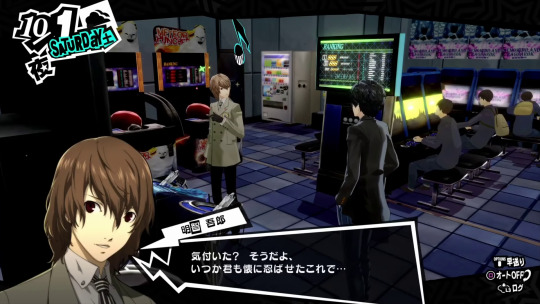
Akechi
気付いた? そうだよ、いつか君も懐に忍ばせたこれで⋯
kizuita? sou da yo, itsuka kimi mo futokoro ni shinobaseta kore de...
[lit. you noticed? that's right, some day <see below>...]
Let's take a quick look at the grammar of this line, which I think is dual-meaning in Japanese just as it was in English (and if any of this seems like bullshit please get in touch, as it never ends well when I try to produce sentences of my own):
Akechi does not finish this sentence—he's left off the verb. So, as often happens with him, his meaning is ambiguous. Let's take the obvious one first:
いつか君も懐に忍ばせたこれで【ある】
itsuka kimi mo futokoro ni shinobaseta kore de [aru]
Some day you, too, will have one of these concealed in your pocket.
Short and sweet: "I carry one of these, concealed, and some day you will too". Note that there's nothing here about practicing, as there is in the English.
But there's another possible meaning here:
いつか君も懐に忍ばせたこれで【撃ってあげる】
itsuka kimi mo futokoro ni shinobaseta kore de [utte ageru]
Some day I'll [shoot] you, too, with this thing concealed in my pocket.
WELP. Like I say, I'm not entirely sure, but I do think the strong likelihood is that this dual meaning exists in Japanese.
I should say I don't think there's necessarily a suggestion here that he carries an illegal gun (though since Naoto has one in P4, it's very possible)—I think it's a metaphorical pocket, his inventory in the Metaverse.
Though I don't think this is really what's going on, there are also a startling number of idioms with futokoro that suggest embracing....
but what is the futokoro?
Idiomatically speaking, 懐 futokoro often translates pretty cleanly as "pocket". But something else is going on: your futokoro is explicitly your breast pocket.
Originally, it was the flap in the front of your kimono where you tucked things away. And so it also appears in a lot of idioms relating to the bosom, or the heart. 懐に飛び込む futokoro ni tobikomu is to throw yourself into someone's arms. 懐に入る futokoro ni hairu, for instance, means to worm your way into someone's affections, or to win someone's confidence—sound familiar at all?
But there's something else going on, of course, with Akechi concealing a weapon in his breast pocket:
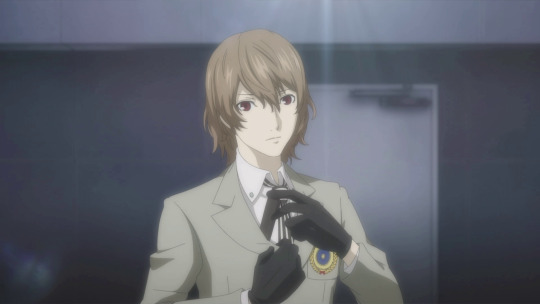
Yep. Here's the payoff for this line in rank 5. Akechi tucks that silencer away in his breast pocket—just like he told Joker he would. And then he laughs. So did he know at rank 5 that this was going to happen, or did he bring this up for some other reason? Well, you decide.
By the way, here's Joker's question about gunplay:
Joker
撃ち慣れてる?
uchi nareteru?
Are you used to gunplay?
The Japanese just means "Are you used to shooting guns?"—I'm not sure it has any of the more, er, fanfic connotations of the English "gunplay". @specterthief agrees there doesn't seem to be any innuendo to the Japanese line.
the scene in english
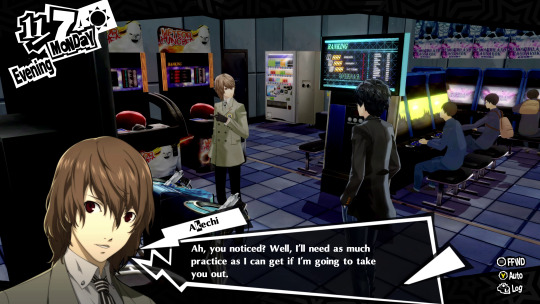
Akechi: Ah, you noticed? Well, I'll need as much practice as I can get if I'm going to take you out.
Let's look at what's happening here, because it happens very often. Like much of Akechi's dialogue, this line in rank 5 was originally a double entendre—it has a very obvious, and relatively innocuous, meaning, but if you squint, you can see Akechi is hinting at something far less innocuous.
Wordplay of this kind takes a lot of time, thought and skill to translate. So what happens in practice is that the translator has to choose one meaning to put front and centre. The English translator has decided, very reasonably, that Akechi's implied "I will kill you" is more important than the joke about the concealed weapon.
To be clear, this was probably the right call. I love the relative subtlety of the Japanese and the 11/20 callback, but it's important that people playing the game understand what's going on—even if, over here in blorboland, it's clear that He Would Not Fucking Say That.
the scene in spanish
Do sit down.
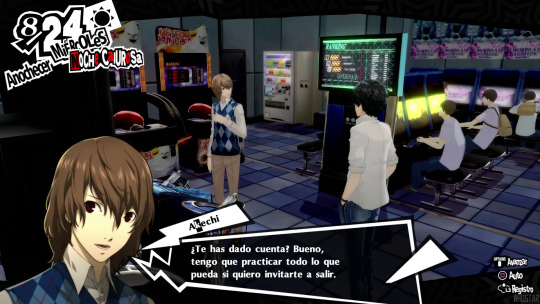
Akechi: ¿Te has dado cuenta? Bueno, tengo que practicar todo lo que pueda si quiero invitarte a salir.
Now, I need to be as up front as I can possibly be about the fact that I do not speak Spanish. But I know a lot of people who do, and they have responded with one voice:
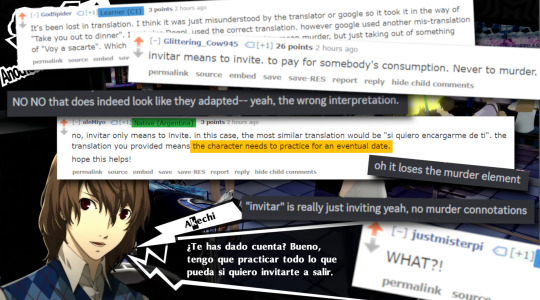

...
"Ask you out"? "ASK YOU OUT"?????
This is what is meant by "the Xerox effect".
We start in Japanese, with the relatively subtle "I have a concealed weapon", which becomes "I'm going to shoot you with a concealed weapon" if you think about it a little more. Then, in English, we become more blatant, with "take you out" having the up front meaning that Akechi will shoot Joker; rather than being subtext, it's now the point of what he's saying. And it's introduced something new—the alternate alternate meaning, of "take you out [on a date]".
It is possible that the Japanese line has a third meaning, very similar to this reading of "take you out"—you would have to torture the context here to get dating from the English, in the same way you'd have to torture the Japanese to get embracing from it.
But there's no torture in the Spanish. Oh, no. Spanish Akechi, as they say, just fucking goes for it. and why the hell not.
but what happened here?
The Spanish localisation is an indirect translation, translated not from the Japanese original, but from the existing English translation. It retains any and all errors in the English script because of this. And when the Spanish translator looked at this line of Akechi's, they saw not the original Japanese dual meaning, the one the English translator saw, but the one the English translator introduced—the dual meanings of the English "take you out".
And the Spanish translator, again, had to choose which of Akechi's seeming dual meanings to keep. Should they keep the line about shooting Joker? Or should they keep the line about taking Joker on a date?
Just like photocopying a photocopy, detail and accuracy are progressively lost, and errors accumulate. Of course, these indirect translations are not without their positives—translating from English allows for a far wider range of translations to be done quicker and more cheaply. Without them, far fewer languages would see official translations at all.
Also, it's really funny and that Spanish translation is a gift.
revision history
click here for the latest version.
v1.1 (2024/01/11)—confirmed no innuendo on uchi nareteru.
v1.0 (2024/01/10)—first posted.
#asks#persona 5#p5 meta#translation#japanese language#spanish language#(what)#shuake#goro akechi#ren amamiya
234 notes
·
View notes